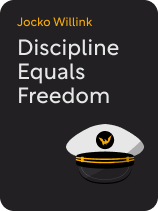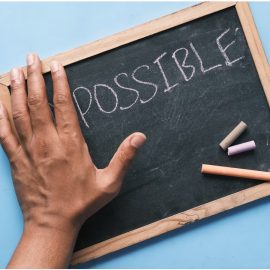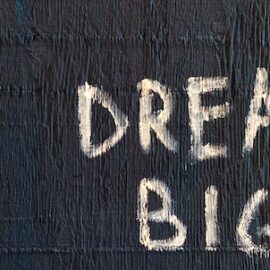

This article is an excerpt from the Shortform book guide to "Discipline Equals Freedom" by Jocko Willink. Shortform has the world's best summaries and analyses of books you should be reading.
Like this article? Sign up for a free trial here.
How can you live a disciplined life? What areas of your life need the most discipline?
Discipline is a principle that should affect all spheres of life. However, Jocko Willink in Discipline Equals Freedom highlights a few key areas of daily life where you should apply discipline for greater health and self-improvement.
Let’s look at how you can successfully live a disciplined life every day.
Exercise
Exercise has tremendous benefits for physical and mental health. Because of this, it’s important to include some kind of exercise in your disciplined life. Willink suggests a few key tips for exercising in a disciplined way:
1. If you don’t think you have time to exercise, wake up earlier. In the early morning, fewer people are awake, there are fewer distractions, and you’ll feel like you’ve got a head start on everyone else.
| What’s the Best Time to Work Out? It Depends… Is the early morning really the best time to get your workout in? Studies show that exercising in the morning is more effective for increasing metabolism and burning fat. As Willink points out, morning workouts allow you to work out consistently without distractions. So, if your goal is weight loss, maybe the fat loss benefits and scheduling consistency of a morning workout would suit you better. When you exercise in the evening, your body uses less oxygen than in the morning, increasing the efficiency of your energy and allowing you to perform better. So, if performance is your goal and your schedule allows it, maybe evening workouts are best for you. |
2. Set up a home gym. Willink’s overarching advice is to do what you can with whatever you have to get your workout in. However, setting up a home gym can add variety to your workout routine and it doesn’t have to be complicated. Willink’s home gym essentials include a pull-up bar, rings/dip bar, squat rack, barbell, and bumper plates.
3. Practice martial arts. Besides practical defense skills, the author promotes martial arts for their benefits to personal development. Willink explains that not only are they a good form of physical conditioning, but they also develop mental fortitude and teach you to persevere through difficult situations. The martial art that Willink recommends most for personal development is Brazilian jiu-jitsu.
This is a fighting technique that focuses on controlling your opponent through grappling and submission holds. Willink suggests practicing this martial art above others because it’s complex and mentally stimulating. Besides these personal benefits, it’s also good to know for self-defense, because the first goal of jiu-jitsu is to break free from your opponent and get away.
When choosing a place to practice jiu-jitsu, Willink says to research your instructor to make sure they’re qualified (preferably a purple belt or higher). Additionally, both the instructor and class should be friendly. Willink says that when done right, jiu-jitsu should be fun.
(Shortform note: Martial arts have been shown to improve health in many ways, but not much research has been done on jiu-jitsu. However, one small study found that jiu-jitsu is associated with many personal and social benefits, such as improved physical health, stress relief, and confidence, as well as increased tolerance and respect for others. A larger meta-analysis of martial arts research found that tai chi is the most studied martial art and has the most proven health benefits. This martial art is low-impact, mostly emphasizing balance and meditative focus. Its benefits include stress reduction and increased lower-body strength, as well as improved agility, balance, and posture.)
Diet
As with exercise, Willink has a few key tips for applying discipline to your diet:
1. Eat mostly fat, then protein; minimize carbohydrates and sugar. Willink bases his diet on the premise that human bodies aren’t adapted to eating many of the farmed and processed foods on the modern menu. So, he eats what he calls a paleo (or caveman) diet. The diet consists of:
- Meat (grass-fed and free-range if possible)
- Fish
- Eggs
- Vegetables
- Fungi
- Limited dairy (butter, cream, milk yogurt, cheese)
- Limited fruit
Willink suggests avoiding:
- Potatoes
- Grains
- Legumes
- Refined salt and sugar
- Processed oils
2. An occasional treat is okay, but only occasionally. When you do enjoy a treat, opt for a healthy option with less sugar, like dark chocolate. Willink suggests avoiding sugar because it’s addictive and unhealthy. Too much sugar can raise your blood sugar and insulin levels, which might lead to chronic health conditions like type-2 diabetes. After you avoid sugar consistently for a while, you won’t crave it as much.
(Shortform note: Research shows that sugar leads to increased risk of obesity, diabetes, and heart disease. One study shows that people consuming a high sugar diet (17-21% of daily calories) have a 38% increase in heart disease risk compared to people who only consume 8% added sugar each day. The American Heart Association suggests that women eat 24 grams of sugar or less, and men consume 36 grams or less.)
3. When appropriate diet foods aren’t available, use discipline to fast. Willink explains that humans can go up to 30 days without food. So, when you justify eating those complimentary company doughnuts at your work meeting because you haven’t had breakfast, hold off. You can make it to lunch. Besides being a good solution for maintaining diet discipline, fasting also has many of its own benefits that make it worth implementing into a regular routine. Willink cites its physiological benefits like reducing inflammation, lowering insulin levels, inducing cell repair, increasing endorphins, and so on.
(Shortform note: If you’d like to apply discipline to your diet and reap the long-term benefits of fasting regularly, Fast. Feast. Repeat. teaches you how to incorporate fasting into your daily routine. You can get started with a four-week program that eases you into the fasting lifestyle by gradually increasing your fasting window.)
Sleep
In order to practice discipline and have energy to perform well during the day, it’s important to apply discipline to your sleep habits at night. Adults need anywhere from seven to nine hours of sleep on average. Lack of sleep can lead to increased blood pressure, negative hormonal changes, immune system suppression, and cognitive effects like trouble focusing and thinking. Here are a few ways the author suggests to sleep with discipline:
1. Go to bed earlier. By going to bed early, you’ll be able to wake up earlier and vice versa. These two habits reinforce each other in a feedback loop. Don’t break this loop.
(Shortform note: Going to sleep early (and staying asleep) is easier if you go to bed when you first feel naturally tired in the evening. Ignoring this feeling and forcing sleep later can cause you to sleep less soundly.)
2. Work out at least once during the day so that you start to feel tired in the evening, but avoid a workout less than two hours before bed to avoid feeling too energized for sleep.
(Shortform note: Willink suggests avoiding exercise for at least two hours before you plan to sleep, but research shows you can complete an intense workout up to one hour before bed with no effect on sleep. So, put the kids to bed and go knock out some burpees.)
3. Be consistent with your sleep habits, even through weekends. If you stay up/sleep in late on Friday and Saturday, it’ll be harder to fall asleep early on Sunday. As a result, your sleep schedule for the work week will likely be compromised and require lost sleep to correct (for example, waking up early on Monday, despite not being able to fall asleep until late Sunday night).
4. Avoid viewing computer and phone screens in the evening. The light keeps you awake, and most of the content you use is designed to keep you clicking.
(Shortform note: While it’s good to avoid electronic light around bedtime, you can program your body for sleep by facing natural sunlight at two key times of day: at least once in the morning after you wake up and again in the afternoon for 10-60 minutes (depending on cloud cover). This will also help you sleep consistently by maintaining a healthy circadian clock, an internal system that determines our sleep/wake cycle among other processes.)
5. Read a book. This will reign in your thoughts and help you relax. Willink suggests choosing something educational but not too interesting because this might tempt you to keep turning pages and stay awake.
(Shortform note: Research shows that reading helps induce sleep. One study demonstrates that people who read before bed are 14% more likely to report improved sleep. Building on Willink’s tip to choose a book that isn’t too interesting, don’t read something that’s frightening or disgusting either. Finally, if you’re reading on an electronic screen, make sure your device doesn’t emit blue light, as this can also disrupt your sleep cycle.)

———End of Preview———
Like what you just read? Read the rest of the world's best book summary and analysis of Jocko Willink's "Discipline Equals Freedom" at Shortform.
Here's what you'll find in our full Discipline Equals Freedom summary:
- Lessons and the philosophy of discipline from a Navy SEAL
- The importance of daily habits like waking up early and putting off breaks
- How self-sabotage actually stems from laziness






